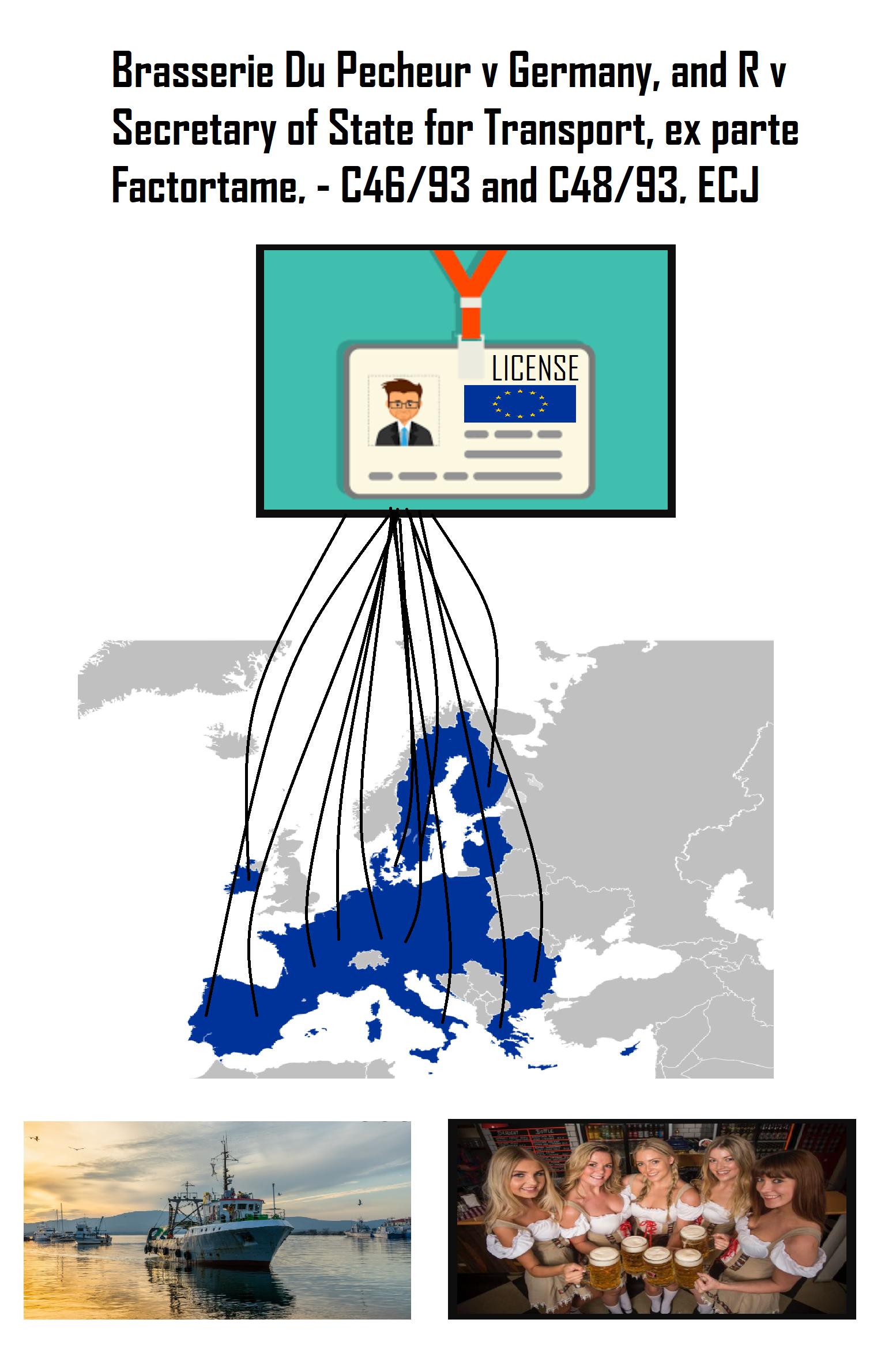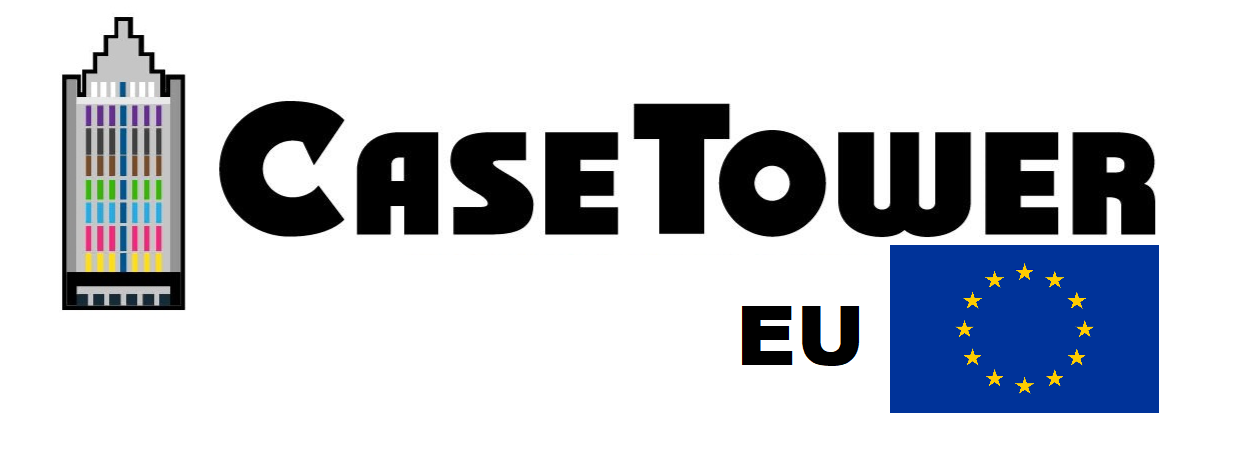Brasserie Du Pecheur v Germany, and R v Secretary of State for Transport, ex parte Factortame, - C46/1993 and C48/1993, ECJ
Citation: Brasserie Du Pecheur v Germany, and R v Secretary of State for Transport, ex parte Factortame, - C46/1993 and C48/1993, ECJ
Rule of thumb 1: Are qualifications gained in one EU state transferable to another one? Yes, an EU citizen qualified in one EU state can become dual or multi-licensed across the EU. This case raised 2 very important points of EU licensing law and affirmed a new EU-wide system of commerce. Firstly, it established that if a person gains qualifications to trade in one EU country, then they must be allowed to register with any other EU country and start trading there too - they must be allowed to trade across all countries in the EU market and have access to all 500 million + people across the whole of the EU, and cannot be stopped by national licensing authorities who may say that the process to gain the qualifications required to trade in their national system was not rigorous enough.
Rule of thumb 2: Secondly, it established that if a person is qualified in one EU country and another country's licensing authorities still refuse to let the person become registered to trade their goods or services in their country, then the restricted person will potentially be entitled to damages from the country's licensing authority for loss of profits or earnings. Building upon the second point, the Court stated that it would have to be the 'sufficiently serious’ breach of EU trading standards law by the national state licensing authority, with a flagrant disregard for EU law, for the person to be awarded damages from the national state licensing authority for not allowing them to trade. This case could also be said to further solidify the jurisprudence principle of 'the supremacy of EU law' - German licensing law and UK licensig law were in direct conflict with EU licensing law, and EU licensing law was deemed to be above them in the hierarchy of laws.
Facts: The facts of this case were that 2 cases - Brasserie du Pecheur and Factortame - were heard at the same time because they raised the same point of licensing law. Brasserie Du Pecheur was a registered beer manufacturer in France. Brasserie agreed deals with retailers/supermarkets/pubs in Germany to sell their beer in Germany. However, Brasserie Du Pecheur's beer was refused entry by German licensing authorities to be sold in Germany because German licensing authorities stated that German beer purity laws required them to have had certain training and education which Brasserie did not possess. The Spanish fishermen, Factortame, case was similar. Factortame were registered as fishermen in Spain. These Spanish fishermen applied to the UK fishing authorities to become registered and charter their vessel in UK waters and begin fishing there. The UK refused to let Factortame fish in the UK waters because they had not met all of the training and qualification requirements of UK fishing laws. Factortame, the Spanish fishermen, and Brasseire Du Pecheur, the French beer manufacturers, both argued that as they had met the stadard to trade in their own home country, then their qualifications should be respected and transferred into other EU countries and they should be allowed to trade in the UK and Germany respectively. They sought a declaration from the EU Supreme Court confirming that their national qualifications in France and Spain could be transferred into Germany and the UK respectively allowing them to trade in the UK and Germany. The Spanish fishermen and Brasserie Du Pecheur both further argued that they were entitled to get damages from the UK and German Governments after the licensing authorities' refusal to grant them a license to trade in their countries. Brasserie estimated how many beers they would have sold in Germany and put a case forward for how much profit they had lost. Factortame did a similar thing estimating how many fish they could have bought and sold at profit.
Parties argued: Germany's beer manufacturing was a key industry for them and fisheries was a key industry for the UK, and they both contested this matter very strongly. Both the UK and German Governments argued that they had introduced the fishing laws and the beer purity laws for good reasons, which they explained. Germany's beer purity laws were introduced on the basis of public health concerns, and the UK's fishing laws were to ensure long-term sustainable fish levels and stop pollution. Germany and the UK explained how their education/training systems were better and more stringent/far-reaching than the French and Spanish ones respectively. Germany and the UK argued that they had introduced licensing requirements which were far superior to France/Spain respectively, and which validly allowed them to tell these beer manufacturers and fishermen from these countries that as their qualificaions/training requirements that were not as good as the ones in their country, then they could not trade in their country. Germany and the UK argued that where national licensing laws are introduced in good faith, as theirs clearly were, then the national government should certainly not be held liable by the EU Supreme Court for damages if they turn out to be in breach of EU law.
Judgment: This case turned out to be something of a draw. The Court upheld the first part of the arguments of the Spanish fishermen and Brasserie Du Pecheur The Court declared that the Spanish fishermen and Brasserie Du Pecheur both met national standards for their qualification and training to provide their fishing services and beer products respectively, and they must be allowed to register in the UK and Germany as well and provide these in the UK and German markets. In short, the arguments about the training/education programmes not being as good in France and Spain as they were in the UK and Germany were simply not accepted. The Court affirmed that Brasserie/Factortame could be required by national licensing authorities to register with the UK and German licensing authorities before trading, but they could be stopped from registering and trading full stop as the already had all the qualifications to trade - education and training - they needed. The Court held that once both Brasserie and Factortame were registered with the German and UK licensing authorities Brasserie should be allowed to sell their French beer in Germany, and that the Factortame should be allowed to fish in UK waters. In terms of the second part of the arguments, the Court did not state that Brasserie and Factortame were entitled to damages from the German and UK licensing authorities for their beer and fishing services being refused in Germany and the UK. The Court did not award Brasserie damages for loss of profits on potential French beers they could have sold in Germany, or likewise for Factortame catching and selling fish. The Court in this case affirmed the 'sufficiently serious test' for deeming when a person or company is entitled to damages for their products or services from one of the public services in a national state, a licensing authority or otherwise, for breach of EU law. The Court held that there must be a blatant disregard of EU law by the national state public sector, the licensing authorities or otherwise, in showing a flagrant contempt for EU law in not allowing a person to trade in the country or otherwise before damages can be obtained. They referred the 'sufficienty serious' question back to the UK and Germany to the national Courts to decide for themselves if EU law had been seriously breached to give rise to damages for Brasserie and Factortame. Although not part of this Judgement, it is not known what happened and if the Spanish fishermen case with the UK licensing authorities settled their matter out of Court, but the German Courts decided that with Brasserie Du Pecheur there had not been a serious enough breach of EU licensing law by the German licensing authorities entitling Brasserie to damages for lost profits on beer they could have sold. This case strongly affirmed overall the very important point of EU licensing law that if someone gets qualified in one EU country, they can transfer these qualifications to another EU country, and that arguments about one country's qualification and training practices not being up to scratch (whether indeed true or not) are simply not accepted by the Court.
Ratio-decidendi:
'10. ... conditions relating to the nationality, residence and domicile of vessel owners and operators as laid down by the registration system introduced by the United Kingdom were contrary to Community law, but that it was not contrary to Community law to stipulate as a condition for registration that the vessels in question must be managed and their operations directed and controlled from within the United Kingdom. 20 As appears from paragraph 33 of the judgment in Francovich and Others, the full effectiveness of Community law would be impaired if individuals were unable to obtain redress when their rights were infringed by a breach of Community law. [...] 55 As to the second condition, as regards both Community liability under Article 215 and Member State liability for breaches of Community law, the decisive test for finding that a breach of Community law is sufficiently serious is whether the Member State or the Community institution concerned manifestly and gravely disregarded the limits on its discretion. 56 [The Court said factors to consider include...] the clarity and precision of the rule breached, the measure of discretion left by that rule to the national or Community authorities, whether the infringement and the damage caused was intentional or involuntary, whether any error of law was excusable or inexcusable, the fact that the position taken by a Community institution may have contributed toward the omission, and the adopted or retention of national measures or practices contrary to Community law... 57 On any view, a breach of Community law will clearly be sufficiently serious if it has persisted despite a judgment finding the infringement in question to be established, or a preliminary ruling or settled case-law of the Court on the matter from which it is clear that the conduct in question constituted an infringement. [...] 63. In order to determine whether the breach of Article 52 thus committed by the United Kingdom was sufficiently serious, the national court might take into account, inter alia, the legal disputes relating to particular features of the common fisheries policy, the attitude of the Commission, which made its position known to the United Kingdom in good time, and the assessments as to the state of certainty of Community law made by the national courts in the interim proceedings brought by individuals affected by the Merchant Shipping Act'.
'conditions relating to ... operators as laid down by the registration system (licensing) ... contrary to Community law', ECJ at 10
'individuals ... to obtain redress when their rights were infringed by a breach of community law... (at 20) Member state liablity ... decisive test... breach of Community law is sufficiently serious', ECJ at 55

Warning: This is not professional legal advice. This is not professional legal education advice. Please obtain professional guidance before embarking on any legal course of action. This is just an interpretation of a Judgment by persons of legal insight & varying levels of legal specialism, experience & expertise. Please read the Judgment yourself and form your own interpretation of it with professional assistance.

